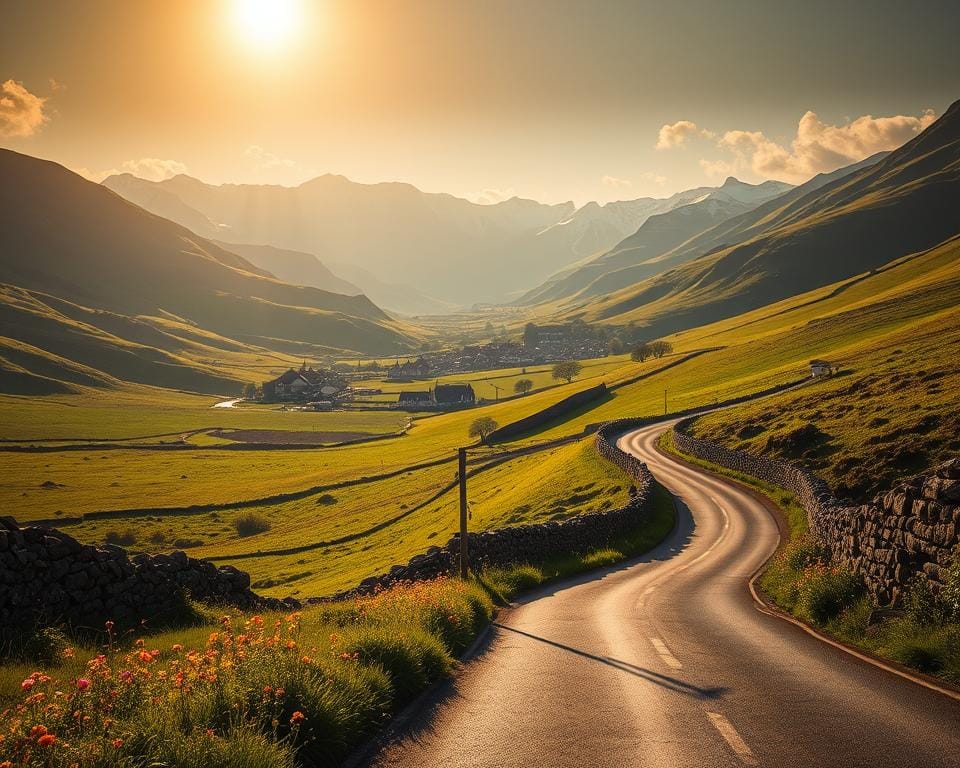What if the secret to an unforgettable British adventure isn’t where you go, but how you prepare? With over 20 million leisure journeys clogging roads on peak bank holidays, the difference between stress and serenity often comes down to one thing: smart planning.
Having navigated everything from Cornwall’s winding coastal roads to the Highlands’ misty trails, I’ve learned that Britain’s compact size is its greatest strength. You can breakfast in a bustling city, lunch in a quaint village, and dine by the sea – all in a single day. But without structure, you’ll miss hidden gems while wrestling with last-minute accommodation searches or gridlocked routes.
The magic lies in balancing meticulous organisation with spontaneous detours. Shoulder-season travel slashes costs and crowds, while mid-week starts let you breeze through landscapes others battle to see. My approach? Build a flexible framework that prioritises key stops, then leave space for those unplanned moments that turn a simple trip into lifelong memories.
Key Takeaways
- Britain’s small scale enables diverse experiences within short driving distances
- Strategic preparation dodges peak-time traffic and inflated prices
- Mid-week or off-season travel maximises enjoyment and savings
- A structured-yet-flexible itinerary balances must-see spots with spontaneity
- Thorough research prevents missed opportunities at popular attractions
- Local knowledge transforms good routes into extraordinary journeys
Setting Your Road Trip Goals and Expectations
The foundation of any great adventure? Knowing what makes your heart race. My golden rule: design your trip around experiences that spark genuine excitement, not just Instagrammable spots. Whether you’ve got three days or three weeks, clarity transforms a basic drive into something extraordinary.
Determining Your Trip Length and Pace
Time shapes everything. A weekend escape works brilliantly for Cornwall’s fishing villages, while 10 days let you connect Edinburgh’s cobbled streets with the North Coast 500’s wild beauty. I once squeezed Snowdonia, the Cotswolds, and Bath into seven days – thrilling, but exhausting. Now I prioritise fewer stops with deeper exploration.
Aligning Personal Interests with Destinations
Britain serves up endless flavours. History buffs might pair York’s Viking legacy with Durham’s cathedral trails. Foodies could chase Somerset cider routes or Whitstable’s oyster sheds. My last trip focused entirely on coastal paths – 23 beaches in five days! Always discuss must-see places with companions early to avoid itinerary clashes later.
Pro tip: Mark driving times realistically. That Google Maps estimate? Add 30% for photo stops and wrong turns. And always leave one afternoon completely unplanned – magic happens when you follow handwritten signs to “the best scones in Cumbria”.
Researching UK Road Trip Destinations
Britain’s roads are storybooks waiting to be read – each bend reveals castles, coastlines, or villages straight from folklore. My favourite approach? Mix iconic stops with under-the-radar treasures. Start by plotting key points on a map, then connect them like stars in a constellation.

Exploring Top Cities and Countryside
Edinburgh’s Royal Mile thrums with history, while Bath’s honey-stone architecture whispers Georgian secrets. But don’t overlook Cornwall’s fishing coves where time moves slower than the tides. The Lake District stole my heart last autumn – misty fells mirrored in Windermere’s waters, stone bridges arched over babbling becks.
City-country combos work brilliantly. Pair York’s Viking legacy with Yorkshire Dales drystone walls. Or blend London’s Tate Modern with Kent’s planning a cozy staycation vibe in Rye’s cobbled lanes.
Highlights from Iconic UK Regions
Scotland’s North Coast 500 delivers raw beauty – think single-track roads flanked by heather and lochs. For drama, Snowdonia’s mountain passes rival Alpine routes. Coastal lovers should chase Norfolk’s salt marshes or Pembrokeshire’s cliff-top trails.
National park fans: South Downs’ rolling hills charm walkers, while Peak District gritstone edges thrill climbers. My pro tip? Visit the Lake District mid-week to dodge crowds at Buttermere’s glassy waters.
Always cross-check opening times on official sites – that quaint tea room might close Tuesdays! Local tourism boards offer gold-dust advice you won’t find on Instagram.
Crafting Your Custom Itinerary
The art of travel lies in stitching moments between must-see landmarks and serendipitous discoveries. My golden rule? Treat your itinerary like a sketchbook – outline key shapes but leave space for colour outside the lines.
Balancing Driving Time and Leisure
I learned this lesson painfully on a Devon-to-Durham marathon: eight hours behind the wheel leaves no energy for Durham Cathedral’s vaulted ceilings. Now I split long journeys into manageable chunks. Front-load your trip with heavier driving days when enthusiasm peaks, then ease into shorter stints.
| Itinerary Style | Daily Drive Time | Break Strategy | Flexibility Score |
|---|---|---|---|
| Marathon Mode | 6+ hours | Quick fuel stops | ★☆☆☆☆ |
| Balanced Explorer | 3-4 hours | 15-min breaks + lunch detours | ★★★★☆ |
| Serendipity Seeker | 1-2 hours | Hourly photo stops | ★★★★★ |
Allowing for Spontaneous Stops Along the Way
Some of my favourite memories started with “Let’s see where this lane goes”. Buffer time isn’t wasted – it’s an investment in unexpected magic. That 15-minute break rule? Perfect for stumbling upon Dorset’s hidden bluebell woods or Norfolk’s marshland watchtowers.
Try themed days to maintain focus while embracing spontaneity. My “Pie & Pint Pilgrimage” through Yorkshire had scheduled stops at Theakston’s Brewery but allowed detours to village bakeries. The result? Eight pastry varieties and three new friendships with local publicans.
Route Planning: How to Plan a UK Road Trip
The rhythm of your journey begins with smart route choices. I’ve discovered that Britain’s charm often hides between motorways – think single-track lanes flanked by Scottish heather or Devon’s hedge-lined byways where foxes dart across your path.

Selecting the Best Roads and Scenic Detours
Start by sketching your core route using Google My Maps. Plot must-see stops first – maybe the Giant’s Causeway or Bath’s Roman baths. Then layer in RAC Route Planner’s live traffic updates and fuel calculations. Last summer, this combo saved me from M6 tailbacks near Birmingham.
Always swap at least one motorway stretch for B-roads. Yes, they take longer, but winding through the Peak District’s snake passes beats staring at lorry rear lights. Cross-check AA’s congestion forecasts for trouble spots – especially near Stonehenge on bank holidays.
Pack an Ordnance Survey atlas alongside offline maps. Phone signals vanish mysteriously in Snowdonia valleys. And if you’re driving a campervan? Double-check bridge heights on narrow Cornish lanes – trust me, that scrape sound isn’t part of the adventure.
Pre-Trip Vehicle and Safety Checks
Your car becomes your trusted travel companion – treat it well, and it’ll return the favour. I learned this after a near-miss in the Yorkshire Dales when worn tyres almost ruined a sunset drive. Now I follow a simple mantra: prep thoroughly, drive confidently.
Essential Car Maintenance Tips
Start with the basics. Check oil levels using the dipstick – readings should sit snugly between min and max markers. Test tyre treads with a 20p coin: if the outer band shows, you’re below the 1.6mm legal limit. I once spotted this issue early, avoiding a potential blowout on Scotland’s winding roads.
Don’t forget fluids. Coolant keeps engines happy in summer traffic jams and frosty mornings alike. Top up washer fluid to battle British weather’s muddy surprises. A quick light check takes minutes – faulty brake lights caused my mate’s only driving fine in a decade!
Preparing a Roadside Emergency Kit
Pack for peace of mind. My kit’s saved me twice: jump leads revived a flat battery near Dartmoor, while a thermal blanket eased a three-hour breakdown wait in Wales. Essentials include:
- High-vis jacket and warning triangle
- Torch with spare batteries
- First aid supplies and basic tools
| Check Item | Quick Test | Pro Tip |
|---|---|---|
| Oil Level | Dipstick markers | Check when engine’s cold |
| Tyre Health | 20p coin test | Include spare tyre |
| Breakdown Cover | Policy details | Verify destination coverage |
Finally, make sure your MOT covers the entire trip. Booking a service beforehand? Smart move if you’re nearing the due date. With these checks done, you’re ready to focus on adventures, not anxieties.
Budgeting and Cost-Saving Strategies
Smart budgeting transformed my Northumberland coastal drive from a wallet-drainer to a value-packed adventure. The secret? Treat your pounds like precious fuel – every mile should deliver maximum joy without financial stress.
Mastering Fuel and Accommodation Maths
I never hit the road without consulting the RAC’s fuel cost calculator. Plugging in my Fiat 500’s stats for a 500-mile Cornish loop showed £87 diesel costs – spot-on accurate. For overnight stops, I’ve found sweet spots between comfort and cost:
| Option | Avg Price | Booking Lead Time | Perks |
|---|---|---|---|
| Hotels | £150/night | 2-3 weeks | Loyalty points |
| B&Bs | £60-£90 | 1 week | Local breakfasts |
| Hostels | £25/bunk | 48 hours | Social kitchens |
Booking just 15 days ahead slashed my Lake District hotel bill by 55% last spring. Always stash £20 daily for parking charges and that irresistible farm shop cheese board.
Car Hire Hacks That Actually Work
My golden rule for rentals? Compare excess insurance separately. A £9/day policy from iCarCoverage once saved me £340 versus the hire company’s offer. Use comparison sites like Zest Car Rental to spot hidden fees – I’ve seen identical vehicles priced £23/day versus £41!
Pro tip: National Trust membership pays for itself in three castle visits. Pair it with supermarket meal deals for £3 lunches overlooking Jurassic Coast cliffs. Your budget (and taste buds) will thank you.
True adventures aren’t measured in miles, but in moments that linger long after you’ve unpacked. My most vivid travel memories? Watching sunrise over Bamburgh Castle’s empty beach after a spontaneous detour, and sharing stories with a Cumbrian shepherd who redirected me to a hidden waterfall.
Britain rewards those who blend preparation with curiosity. That crumpled map in your glovebox holds more potential than any pre-booked tour. Prioritise local knowledge – a Yorkshire butcher once tipped me off about Wales’ lesser-known coastal routes that became my trip’s highlight.
Pack your sense of wonder alongside the emergency kit. Leave space for rainy-day museum visits and impromptu cream tea stops. When you finally turn the ignition key, you’re not just starting an engine – you’re unlocking countless stories waiting to unfold. The open road’s calling. Are you ready to answer?

